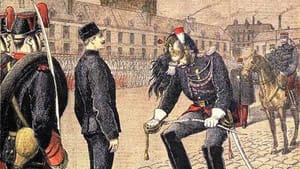Stay in the Loop
BSR publishes on a weekly schedule, with an email newsletter every Wednesday and Thursday morning. There’s no paywall, and subscribing is always free.
A retelling of the Dreyfus affair
'An Officer and a Spy' by Robert Harris

Robert Harris’s An Officer and a Spy takes us back to late 19th-century France, when the French Third Republic was still smarting from the defeat it took at the hands of the upstart Prussian Empire in 1870.
The book opens with a middle-aged (40 was middle-aged then) army major, Georges Picquart, witnessing the public degradation of Captain Alfred Dreyfus, who has been convicted of treason for passing military secrets to the Germans. Dreyfus is being ceremoniously stripped of his army uniform and medals and will be sent to Devil’s Island for life. Major Picquart has been given the job of overseeing the Dreyfus affair for the High Command. His excellent reports earn him high praise and a promotion: to being the youngest colonel in the French Army and command of “the Statistical Bureau,” as the French intelligence service was called.
The remainder of the book details the unwinding of the plot against Captain Dreyfus, which had been cooked up by leading members of the French military for a variety of reasons. In one case, an outspoken general hopes to ride the publicity of the sensational conviction of Dreyfus to the Élysée Palace. For others, the conviction of Dreyfus is a function of their deep-seated anti-Semitism: Dreyfus is a Jew.
You are there
Harris is one of best modern writers of historical fiction. His technique is to immerse the reader in a bygone era through the eyes of a sympathetic first-person narrator. In most books, Harris concentrates on one aspect of that bygone world, combining his fiction with historical fact. For example, in Harris’s best book, Pompeii, he looked back at the volcanic eruption of Mt. Vesuvius in 79 A.D. through the eyes of a Roman aquarius, or hydraulic engineer. The resulting book was not only immensely entertaining, but it was also a primer on Rome’s incredible aqueducts.
In An Officer and a Spy, Harris’s first-person narrator is a young army major who at first is convinced of Dreyfus’s guilt. When he is placed in charge of army intelligence, however, he discovers that the case against Dreyfus is not only paper-thin but also riddled with contradictions and prejudices. Along the way, Harris gives us a history of early espionage.
The sound and the fury
Harris’s books lend themselves to being listened to. The combination of strong characters, interesting plots, and curious facts create an irresistible formula for keeping one awake and occupied during rush-hour traffic jams.
An Officer and a Spy is well worth listening to in the audio version, although it is not as good as some of Harris’s previous books. One difference is the reader: John Lee narrated Harris’s previous books, and Lee's precise, almost otherworldly voice added a touch of danger to the already exciting narratives. This book’s narrator is David Rintoul. While he does an excellent job, the onslaught of French characters, many of whom lack distinctive traits, make it difficult to keep track of all of them. In an audiobook, it is vital that characters be well delineated because, of course, one cannot conveniently go back to reread a section. It was also disconcerting to hear the different pronunciations of Dreyfus ("dry" or "dray") — it tells you something about the interest generated by the characters and plot that I would notice this.
The details of life in Belle Époque France are exquisitely displayed in Harris’s narrative. Picquart is involved in a web of romances (with benefits) with the wives and sisters of his friends. We are given mini portraits of the great men who come to be dreyfusards or supporters of Dreyfus, including Émile Zola, Anatole France, Jean Jaurès, and future prime minister George Clemenceau. Zola’s famous J’Accuse is liberally quoted. In other words, Harris has done his usual great job of research, editing, summarizing, and — most importantly — dramatizing.
Everything is perfect in its parts, but fails short as a whole.
Get on with it
The book suffers by being too long. The details of the case against Dreyfus are worried like beads — over and over again we sift through the few documents central to the case. As is always the case, when Colonel Picquart pieces together the Dreyfus puzzle and discovers that the actual traitor is another man, a Major Esterházy, the Army’s attempted cover-up makes matters worse. But not at first. Picquart is demoted and banished, Esterházy is exonerated, and Dreyfus remains dying by degrees on Devil’s Island. Then Dreyfus is given a new trial! But there is no happy ending to this sordid tale of betrayal, hubris, and espionage.
Harris, as usual, does not take the simple path. While it is clear that Dreyfus is a martyr, Harris’s Dreyfus is not a particularly likeable man. He is shortsighted, ungrateful, and socially inept. Also, some of those who have played a large part in forging evidence to convict Dreyfus are shown to be, at heart, decent men who feel bound by their duty to the Army to do whatever they are ordered to do. The consequences of that kind of blind loyalty are with us to this day — my (fill-in-the-blank) right or wrong!
The parallel to the present is unmistakable: Where does all of this spying and secrecy lead? Not to the truth or even to security. In the Dreyfus affair, it led to a national scandal that haunted France for decades.
What, When, Where
Robert Harris, An Officer and a Spy. Random House, 2014. Audiobook narrated by David Rintoul. http://www.randomhouse.com/book/225022/an-officer-and-a-spy-by-robert-harris
Sign up for our newsletter
All of the week's new articles, all in one place. Sign up for the free weekly BSR newsletters, and don't miss a conversation.
 Armen Pandola
Armen Pandola